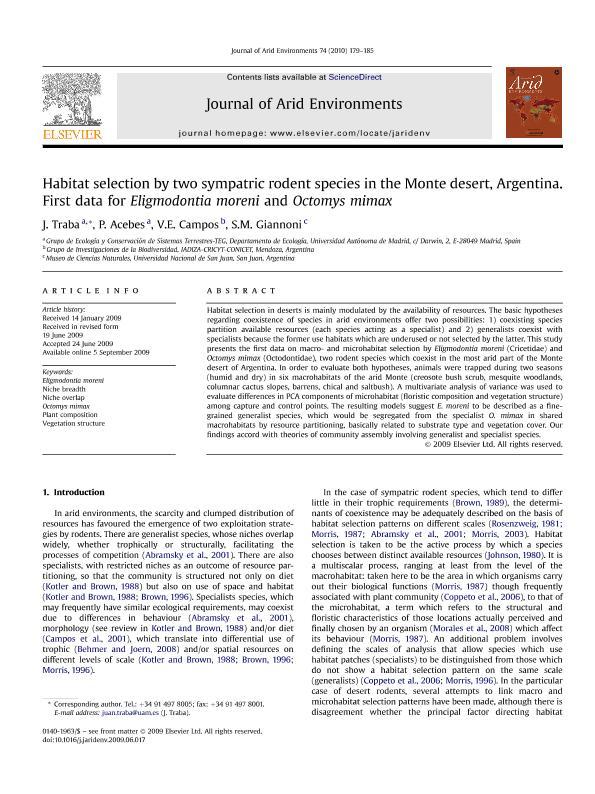Mostrar el registro sencillo del ítem
dc.contributor.author
Traba, Juan
dc.contributor.author
Acebes, Pablo;
dc.contributor.author
Campos, Valeria Evelin

dc.contributor.author
Giannoni, Stella Maris

dc.date.available
2023-05-08T12:01:27Z
dc.date.issued
2010-12
dc.identifier.citation
Traba, Juan; Acebes, Pablo;; Campos, Valeria Evelin; Giannoni, Stella Maris; Habitat selection by two sympatric rodent species in the Monte desert, Argentina. First data for Eligmodontia moreni and Octomys mimax; Academic Press Ltd - Elsevier Science Ltd; Journal of Arid Environments; 74; 2; 12-2010; 179-185
dc.identifier.issn
0140-1963
dc.identifier.uri
http://hdl.handle.net/11336/196606
dc.description.abstract
Habitat selection in deserts is mainly modulated by the availability of resources. The basic hypotheses regarding coexistence of species in arid environments offer two possibilities: 1) coexisting species partition available resources (each species acting as a specialist) and 2) generalists coexist with specialists because the former use habitats which are underused or not selected by the latter. This study presents the first data on macro- and microhabitat selection by Eligmodontia moreni (Cricetidae) and Octomys mimax (Octodontidae), two rodent species which coexist in the most arid part of the Monte desert of Argentina. In order to evaluate both hypotheses, animals were trapped during two seasons (humid and dry) in six macrohabitats of the arid Monte (creosote bush scrub, mesquite woodlands, columnar cactus slopes, barrens, chical and saltbush). A multivariate analysis of variance was used to evaluate differences in PCA components of microhabitat (floristic composition and vegetation structure) among capture and control points. The resulting models suggest E. moreni to be described as a finegrained generalist species, which would be segregated from the specialist O. mimax in shared macrohabitats by resource partitioning, basically related to substrate type and vegetation cover. Our findings accord with theories of community assembly involving generalist and specialist species.
dc.format
application/pdf
dc.language.iso
eng
dc.publisher
Academic Press Ltd - Elsevier Science Ltd

dc.rights
info:eu-repo/semantics/openAccess
dc.rights.uri
https://creativecommons.org/licenses/by-nc-sa/2.5/ar/
dc.subject
ELIGMODONTIA MORENI
dc.subject
NICHE BREADTH
dc.subject
NICHE OVERLAP
dc.subject
OCTOMYS MIMAX
dc.subject
PLANT COMPOSITION
dc.subject
VEGETATION STRUCTURE
dc.subject.classification
Zoología, Ornitología, Entomología, Etología

dc.subject.classification
Ciencias Biológicas

dc.subject.classification
CIENCIAS NATURALES Y EXACTAS

dc.title
Habitat selection by two sympatric rodent species in the Monte desert, Argentina. First data for Eligmodontia moreni and Octomys mimax
dc.type
info:eu-repo/semantics/article
dc.type
info:ar-repo/semantics/artículo
dc.type
info:eu-repo/semantics/publishedVersion
dc.date.updated
2023-03-21T18:17:35Z
dc.journal.volume
74
dc.journal.number
2
dc.journal.pagination
179-185
dc.journal.pais
Estados Unidos

dc.description.fil
Fil: Traba, Juan. Universidad Autónoma de Madrid; España
dc.description.fil
Fil: Acebes, Pablo;. Universidad Autónoma de Madrid; España
dc.description.fil
Fil: Campos, Valeria Evelin. Consejo Nacional de Investigaciones Científicas y Técnicas. Centro Científico Tecnológico Conicet - Mendoza. Instituto Argentino de Investigaciones de las Zonas Áridas. Provincia de Mendoza. Instituto Argentino de Investigaciones de las Zonas Áridas. Universidad Nacional de Cuyo. Instituto Argentino de Investigaciones de las Zonas Áridas; Argentina
dc.description.fil
Fil: Giannoni, Stella Maris. Universidad Nacional de San Juan; Argentina. Consejo Nacional de Investigaciones Científicas y Técnicas. Centro Científico Tecnológico Conicet - San Juan; Argentina
dc.journal.title
Journal of Arid Environments

dc.relation.alternativeid
info:eu-repo/semantics/altIdentifier/url/https://www.sciencedirect.com/science/article/pii/S0140196309002560
dc.relation.alternativeid
info:eu-repo/semantics/altIdentifier/doi/http://dx.doi.org/10.1016/j.jaridenv.2009.06.017
Archivos asociados
